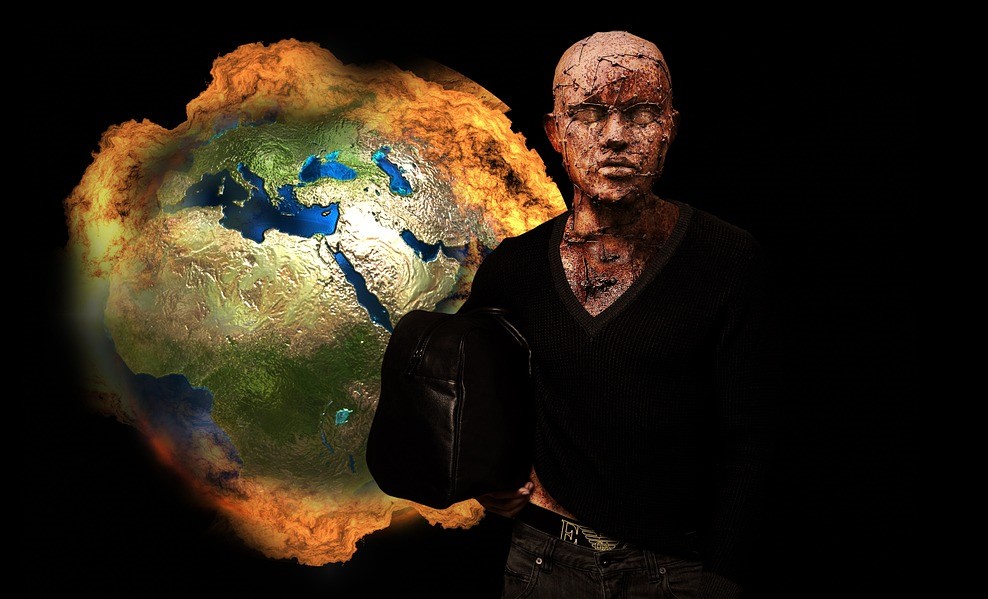Are we going to destroy ourselves
by Francesca Cappelletti (2006) Liceo Sesto Properzio, Assisi/Italy on 2023-06-16

This article was written by Francesca Cappelletti (2006), Liceo Properzio Assisi/Italy, based on the cooperation with Nelly Rosenwirth (2008) from Gisela-Gymnasium München/Germany during an online workshop in March 2023
Thank you, geralt from pixapay, for the use of your image!
ARE WE GOING TO DESTROY OURSELVES?
To date, the most obvious and dangerous effect of climate change is certainly that concerning natural disasters caused by human intervention in the natural environment.
Speaking clearly about the problem is certainly the most effective way to raise awareness among people who do not usually reflect on the situation. The extreme response of the earth to the irreversible damage caused by the actions of man is shocking and requires talking straight.
In a recent interview, my classmates and I asked a biologist whether it was possible nowadays, thanks to the advanced technology at our disposal, to predict the most extreme events. According to recent studies, this still does not seem possible. One way to prevent them, however, according to the biologist, would be: undertaking a path of energy limitations in everyday life, eliminating excessive emissions and unnecessary use of energy or waste production, and choosing hybrid means of transport. We should also avoid the use of disposable items, simple habits that, unfortunately, people do not seem to be in favor of.
Many believe that in the future a way will be found to foresee these events, but it is useless to foresee them, if we are not able to deal with them, for this reason prevention is indispensable. Consequently, a question arises: is there hope of an improvement? Is it possible to hope for a future with fewer natural disasters or less extreme events? Surely the main thing would be to convince, even through legal impositions, citizens to respect the rules necessary to reduce pollution, and consequently climate change, but it is difficult to influence a population of 8 billion individuals. It will only be possible when a common will for change is achieved.
"I have two teenage children, I would like to keep hoping that the condition will improve for their future. We have all the tools to do this, but no one seems able to make use of them.”
These were the words that closed the interview.
The expert`s thoughts can be shared. A lot of parents pose the question and a lot of young people who would like to build a family, worry about it and choose not to do so in order not to let their children live in a declining world.
Will we achieve a healthy future for our children or will we end up destroying ourselves?
FINIREMO PER AUTODISTRUGGERCI?
Ad oggi l’effetto più evidente e pericoloso del cambiamento climatico è sicuramente quello
che riguarda i disastri naturali causati dall’intervento dell’uomo nell’ ambiente naturale.
Parlare del problema in modo chiaro è sicuramente il modo più efficace per rendere consapevoli le persone che non riflettono sulla criticità della situazione. La risposta estrema della terra ai danni irreversibili causati dall’uomo è scioccante e richiede chiarezza.
In una recente intervista, realizzata con i miei compagni di classe, abbiamo chiesto ad un biologo specializzato se al giorno d’oggi fosse possibile, grazie alla tecnologia avanzata di cui disponiamo, prevedere gli eventi più estremi. Secondo recenti studi questo non sembra ancora possibile. Un modo per prevenirli però, secondo il biologo, ci sarebbe: intraprendere un percorso di limitazione al consumo di energia nella quotidianità, eliminare gli eccessi di emissioni e produzione di rifiuti, utilizzare mezzi di trasporto ibridi o evitare l’utilizzo di prodotti usa e getta. Si tratta di abitudini semplici, ma che purtroppo alcune persone non vedono in modo favorevole.
Molti credono che in futuro si troverà un modo per prevedere questi eventi, ma è inutile prevederli, se poi l’uomo non è capace di affrontarli, per questo è indispensabile la prevenzione. E di conseguenza sorge spontanea una domanda: ci sarà speranza di un miglioramento? Sarà possibile sperare in un futuro con meno catastrofi naturali o eventi meno estremi? Sicuramente sarebbe importante convincere, anche se attraverso imposizioni di legge, i cittadini ad attenersi alle norme utili per la riduzione dell’inquinamento, e di conseguenza del cambiamento climatico, ma è difficile condizionare il pensiero di una popolazione di 8 miliardi di individui. Sarà possibile solo quando si sarà raggiunta una volontà di cambiamento comune.
“Ho due figli adolescenti, vorrei continuare a sperare che la condizione migliori per il loro futuro. Abbiamo tutti gli strumenti per farlo, ma nessuno sembra capace di usufruirne.” Queste sono state le parole che hanno chiuso l’intervista.
Il pensiero dell`esperto è condivisibile. Moltissimi genitori si pongono il problema e moltissimi giovani che vorrebbero costruirsi una famiglia, se ne preoccupano e scelgono di non farlo per non far vivere i loro figli in un mondo in declino.
Arriveremo ad un futuro sano per i nostri figli o finiremo per autodistruggerci?



